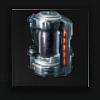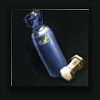Planetary Materials
-

Nano-Factory (advanced planetary material) - 200 units
Only the highly advanced Ukomi superconductor can be rendered small enough for use in nano-factories, microscopic devices programmed to absorb and recycle ambient material into useful matter. Each factory is built from reactive metals, ensuring that they interact properly – or not at all – with their environment, while a mote of industrial explosive automatically destroys them when they have completed their task.$4.95 -

Neocoms (specialized planetary material) - 2,500 units
As an essential component of the navigational and tactical interface of spaceships, Neocoms are a small but essential cornerstone of the interstellar economy.$5.95 -

Noble Gas (raw planetary materials) - 10,000,000 units
This colorless, odorless, and usually nonflammable substance is one of seven known monoatomic gases, or those that do not easily combine with other atoms. They are thus well suited for a variety of manufacturing implementations.$2.75 -

Noble Metals (raw planetary materials) - 10,000,000 units
Highly resistant to corrosion and oxidation, noble metals are somewhat rarer than base metals, yet they are just as sought after for their different electrical, material, and chemical attributes. When painstakingly refined and purified, some noble metal ores can produce "precious metals."$4.75 -

Non-CS Crystals (raw planetary materials) - 10,000,000 units
The orderly, compact nature of crystals makes them well suited for a staggering array of manufacturing processes, in which they are just as often the product of the factory as they are incorporated into many of the tools and machinery used therein.$3.25 -

Nuclear Reactors (specialized planetary material) - 1,500 units
This power core is able to convert heavy elements into electricity by way of nuclear fission, splitting atoms to produce thermal energy on a massive scale. If they are properly shielded and cooled, there are few safer, cleaner ways to power buildings or large vehicles.$6.95 -

Organic Mortar Applicators (advanced planetary material) - 200 units
While nanites are ideal for many forms of construction, sealing joints between large structural bulkheads is a job best left to organic mortar, a thick gel that actively permeates every microscopic gap between two parts. Due to the aggressive nature of the genetically engineered bacteria that intelligently guides into place the hardening condensate material, this paste is extremely hazardous to humans and must be applied by robots.$3.95 -

Oxides (refined planetary material) - 10,000 units
Technically, any chemical compound that contains at least one oxygen atom is an oxide, though some are far more valuable than others. Once broken down and separated from waste material, many oxides can be applied to various industrial processes.$3.95 -

Oxidizing Compound (processed planetary materials) - 100,000 units
Converting various matter from its basic state to an oxidized form requires an oxidizing compound, the most effective of which is a powerful agent made from pressurized reactive gas. Special containers are required to keep the compound from causing significant damage to common metals and organic life.$3.65 -

Oxygen (processed planetary materials) - 250,000 units
Oxygen is a commodity in constant demand. While most stations have their own supply units, smaller depots and space crafts rely on imports.$3.95
















